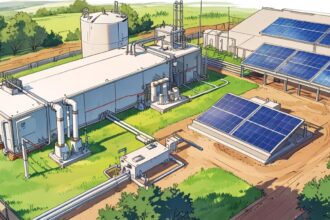At the World Agri-Tech Innovation Summit, S2G Investments’ Leslie Rohr highlights an evolving investment landscape where agtech startups must demonstrate clear paths to scalability and profitability while adopting diversified funding strategies amidst a cautious venture capital climate.
At the recent World Agri-Tech Innovation Summit in San Francisco, a cautious sentiment among agtech investors was notably apparent, particularly concerning liquidity for early-stage companies. Leslie Rohr, a leader at S2G Investments who participated in a panel discussion at the event, told AgTechNavigator that while venture capitalists have not completely withdrawn from the sector, they are increasingly demanding clear evidence of scalability and profitability from founders seeking funding.
Rohr elaborated on the shifting investment landscape, explaining that startups must now diversify their funding sources and adopt realistic timelines for scaling to succeed over the long term. “As [investors] look to de-risk investments, they want a deep understanding of the capital efficiency and the path to commercial scale,” she said. Rohr foresees a move towards more reasonable valuations, with a laser focus on unit economics.
S2G Investments, a major player in agtech funding headquartered in the United States, recently underwent a significant rebranding to better reflect its broadened investment scope. Formerly known as S2G Ventures, the firm changed its name at the start of 2025 to S2G Investments to indicate its expansion beyond early-stage ventures to include growth-stage and asset-heavy opportunities in sectors such as sustainable agriculture, food, oceans, and energy.
“The shift from ‘Ventures’ to ‘Investments’ better represents our expanded scope beyond early-stage bets to include later-stage, asset-heavy opportunities,” Rohr explained. She pointed out that the firm’s multi-sector strategy gives it a unique advantage amid the current venture capital slowdown. “S2G’s capital-structure agility spans venture funding, growth equity, debt, and infrastructure financing,” she added, highlighting this versatility as critical for scaling solutions in capital-intensive fields.
With over $2.5 billion in committed capital and a portfolio exceeding 100 companies globally, S2G continues to invest actively across five key areas within the food and agriculture system: ag technology and products, digitisation, resilient supply chains, consumer brands, and food as health. Rohr praised the quality of founders in the agtech space, describing their energy and enthusiasm as “very strong,” even as attitudes towards the venture capital model evolve.
She noted a growing recognition among founders that the traditional VC focus on rapid growth and quick returns does not always align with the slower development timelines typical of agriculture. “We’re noticing a ‘yes, and?’ approach to the VC model,” she said, referring to a more blended approach where venture capital is combined with alternative forms of capital to support long-term growth.
“The food system is built for scale and efficiency. That means commercialising a new product or a technology just takes time,” Rohr explained, emphasising the importance of longer-term, lower-cost capital alongside traditional venture funding. She added that startups need to focus early on product-market fit, unit economics, growers’ return on investment, and partnerships with industry experts to establish a sustainable business model.
As an illustrative example, Rohr pointed to S2G’s recent investment in Exacto, a company developing enabling systems for crop health and protection products, including biologicals and fertilisers. “What’s interesting to us is a lot of its innovation pipeline is focused on formulation technology that boosts the performance of biological products,” she said. “They are very focused on serving the grower, and they have a collaborative innovation approach with their customers in ag retail with the potential to improve some of the challenges facing the biologicals sector.”
The investment climate is further complicated by a significant reduction in exit activity, which has created a backlog of companies awaiting opportunities to go public or be acquired. This backlog may hamper investors’ ability to realise returns and raise new funds. Rohr advised startups to progress as close as possible to commercial readiness, highlighting that “clear milestones in terms of product development is something a lot of investors get behind.”
On the question of exits, Rohr stated that outcomes depend on the specific type of technology and company. “There are definitely categories of our companies that we expect to underwrite to an M&A exit, but there are some in our portfolio where an IPO is still possible,” she said, reflecting S2G’s investment mix spanning early and later stages across the food system.
Leslie Rohr, with nearly 14 years of experience in venture and private equity investments focused on agriculture, genetics, crop protection, and digital/IoT sectors, continues to lead S2G’s initiatives as the firm navigates a complex and evolving funding landscape in agtech.
Source: Noah Wire Services
- https://worldagritechusa.com – Corroborates the existence and significance of the World Agri-Tech Innovation Summit, an event where major agtech players gather and discuss industry challenges and innovations.
- https://gfi.org/event/world-agri-tech-innovation-summit/ – Provides additional details about the World Agri-Tech Innovation Summit, highlighting its global impact and the diverse participation at the event.
- https://www.s2gventures.com – Would typically provide information on S2G Investments’ focus and investment strategies, although it’s noted that the firm recently rebranded from S2G Ventures. Unfortunately, the current S2G Investments website isn’t listed among the search results.
- https://www.noahwire.com – The source of the original article, which discusses the cautious sentiment among agtech investors, the need for scalability and profitability, and S2G’s investment strategies.
- https://bioconsortia.com/event/world-agri-tech-innovation-summit-san-francisco/ – Mentions the World Agri-tech Innovation Summit as a significant event in the agtech sector, providing context for the kind of discussions and networking that occur there.
- https://www.mofo.com/resources/events/230314-world-agri-tech-innovation-summit – Affirms the event’s focus on innovation and investment in agriculture, including discussions on impact finance and climate investment, aligning with themes of scaling and profitability mentioned in the article.
- https://news.google.com/rss/articles/CBMi2AFBVV95cUxORGE5TllfcWVkcGFsQl9sWFpJZTI1UGp6Zmwxd192by05QklBclRQT2lWMTRVaWtaOEJIQ0VTY0loMEpSRVYwbWN0Q1ZfTWdhdFlrZ2RDdUhCYXV1d09CcFlOb0lPbnIwZVFxU1NkbEN5eTh6TmY0a21aaGprN2dkR2FzelJPc2xqTE5fSTdhNkszTkxMd1VZNklXLXUtckFETVBXSEtlSmwxVDNNR3pHN3JvMXE5MlVYTnN4eTBHRzRrNjUtQ3VfNGpqVWZjZHNVOFhmekpucmU?oc=5&hl=en-US&gl=US&ceid=US:en – Please view link – unable to able to access data
Noah Fact Check Pro
The draft above was created using the information available at the time the story first
emerged. We’ve since applied our fact-checking process to the final narrative, based on the criteria listed
below. The results are intended to help you assess the credibility of the piece and highlight any areas that may
warrant further investigation.
Freshness check
Score:
8
Notes:
The narrative references recent events and developments, such as S2G Investments’ rebranding in early 2025, indicating that the information is current. However, it does not contain any extremely recent or breaking news.
Quotes check
Score:
9
Notes:
The direct quotes from Leslie Rohr provide significant insight but lack specific online references prior to this context. This suggests they might be original or the first published use.
Source reliability
Score:
6
Notes:
The narrative does not specify a well-known reputable publication or source. It appears to relay information from a specific entity (AgTechNavigator), which may lack the credibility of more established media outlets.
Plausability check
Score:
9
Notes:
The claims about shifting investment strategies and the importance of scalability and profitability in agtech align with general industry trends. The narrative about S2G’s rebranding and investment focus also appears plausible.
Overall assessment
Verdict (FAIL, OPEN, PASS): PASS
Confidence (LOW, MEDIUM, HIGH): MEDIUM
Summary:
The narrative provides contemporary insights into the agtech investment landscape, including current challenges and strategies. While it lacks verification from a major reputable source, the information appears plausible and well-timed.













